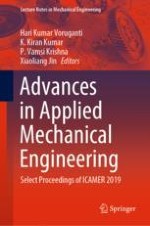2020 | OriginalPaper | Chapter
Performance Improvement of Nanofluid Minimum Quantity Lubrication (Nanofluid MQL) Technique in Surface Grinding by Optimization Using Jaya Algorithm
Authors : Sharad Chaudhari, Rahul Chakule, Poonam Talmale
Published in: Advances in Applied Mechanical Engineering
Publisher: Springer Singapore
Activate our intelligent search to find suitable subject content or patents.
Select sections of text to find matching patents with Artificial Intelligence. powered by
Select sections of text to find additional relevant content using AI-assisted search. powered by
